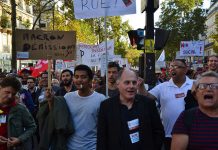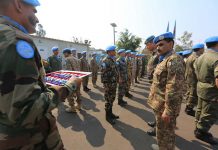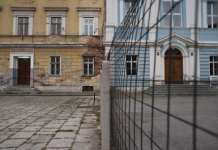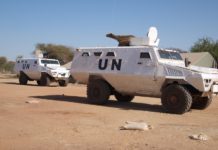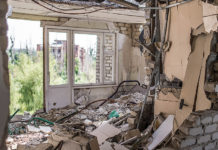Among the aid agencies that poured into Somalia after famine was declared in July were organizations such as the Arab Federation of Doctors, the Mohammed Bin Rashid Establishment of the United Arab Emirates, and the Deniz Feneri Association of Turkey.
They came with their own style. The Saudi National Campaign for the Relief of the Somali People, a project of King Abdullah, sent planeloads of food, including jam and cheese. The International Islamic Relief Organization (IIRO) sent 600 tons of dates. Turkey’s IHH (Foundation for Human Rights, Freedoms and Humanitarian Relief) even ventured outside Mogadishu into territory considered a no-go zone for most international aid organizations because it is not under government control.
They also came with a lot of money. In an emergency meeting in August, the Organization of Islamic Cooperation (OIC), pledged US$350 million for Somalia – “numbers we dream of”, one UN aid worker in Mogadishu said – though it is still unclear how much of this is new funding.
Turkey says it has collected more than $280 million for the Somali effort, while Saudi Arabia’s contribution to UN agencies alone was $60 million, and Kuwait, a country of 3.5 million, contributed $10 million. The United Arab Emirates (UAE) Office for Coordination of Foreign Aid, too, received confirmation of $62 million in contributions to the Horn of Africa emergency.
Gulf countries were able to raise funds with remarkable speed and ease. In the span of three hours, a TV telethon in Qatar raised nearly 25 million riyals ($6.8 million). In a couple of weeks, Kuwait’s International Islamic Charitable Organization (IICO), raised 80,000 dinars ($290,000) in cash by asking for donations in malls, while aid telethons in the UAE reportedly raised an additional $50 million for the Horn of Africa. With many Western donors cutting budgets amid fears of another recession, this region has gained influence in aid, especially in countries with large Muslim populations. Both in terms of funds and action on the ground, the effort in Somalia has put Muslim and Arab donors and organizations onto centre stage.
But their relationship with the broader humanitarian system has been limited at the best of times, and rocky at the worst. For example, most OIC funds for Somalia are not being channelled through multilateral mechanisms, like the UN-administered Consolidated Appeals Process.
Players from the region say they are accustomed to working on their own – due to a history of mutual mistrust, a lack of awareness on both sides, and a perception by some Muslims and Arabs that they are better placed to help under certain circumstances. The UN is now actively trying to improve that relationship, but the road to cooperation and coordination faces many challenges.
How did we get here?
The history of mutual mistrust between the predominantly Western aid system and its counterpart in the Muslim and Arab world is long, say analysts. “These are two china elephants looking at each other,” said Abdel-Rahman Ghandour, development and humanitarian worker, and author of Humanitarian Jihad: Investigation into Islamic NGOs. “They see each other; they know that they’re there; but they can’t move towards each other,” he told IRIN.
Some Muslim aid workers see in the UN system a certain arrogance. “They don’t want to understand us,” one Muslim aid worker said. Others speak of undertones of neo-colonialism in the way aid is delivered and in the relationship between the Muslim aid community and its Western-dominated counterpart.
“They only involve us when it suits them,” the aid worker told IRIN. Often, he added, they are invited to meetings and conferences as “an afterthought”. “You feel you’re being used like window dressing,” he said. “Things are hatched and cooked in the West and then brought to people to eat.”
Some NGOs from the Arab and Muslim world are afraid of being “swallowed up” by the UN system and don’t feel confident they can engage with the UN on an equal footing. “It’s not about experience,” one Arab aid worker said. “The UN has the experience and the upper hand when it comes to everything – information, communication, movement on the ground. There’s no question. But to give them money and let them implement activities, we have to rest assured that we’ll like what comes out in our name.”
He called for a kind of code of ethics or framework of understanding that would outline what both sides mean by certain fundamental principles and outline boundaries of action.
For example, terms like women’s empowerment need to be defined, he said. “How we understand it is not how the UN understands it,” he added. Organizations from this part of the world would fear partnering with the UN if women’s empowerment is understood to mean “removing the hijab [covering a woman’s hair], destroying the family institution and throwing religion out the window.”
Some aid workers and donors from the Muslim and Arab world are also sceptical of the real motivations behind the Western system’s desire to partner with them. “Everyone knows they’re [engaging with us] for the money, not for unity,” another Muslim aid worker said. “Islamic NGOs were a black box that nobody wanted to touch,” he said. “Then they [the UN] realized they were missing out.”
Others do not easily differentiate between the UN Security Council, which has authorized Western interventions into Muslim countries and is seen to be unwilling to tackle the Palestinian question, and humanitarian aid agencies like the World Food Programme (WFP) or the UN Children’s Fund (UNICEF).
For these reasons, many Red Crescent societies in the region, according to one senior aid worker, sometimes try to avoid working with the UN system. “We try to coordinate with – and not be coordinated by – the UN because of neutrality issues,” he told IRIN. “The UN is not considered to be a neutral organization, especially in a conflict set-up.”
Technical standards
Some Muslim organizations have been doing emergency relief work for decades. But many others had until recently focused more on developmental work – building schools and mosques or helping orphans.
And they have ramped up activities. The Qatar Red Crescent, for example, has seen its annual international budget jump from less than $250,000 to more than $45 million in the last decade, according to Khaled Diab, its international cooperation adviser. Turkish NGO IHH, which used to operate projects of $600-700,000 dollars a year for the Horn of Africa has increased its budget to more than $20 million – one of its biggest campaigns ever, according to its vice-president, Hüseyin Oruç.
But the UN and the broader humanitarian system have their reservations too. And with the influx of programming have come some clashes of ideology. “Their awareness and subscription to commonly-understood best practice isn’t necessarily there,” one senior Western aid worker said of NGOs from the region, citing neglect of environmental impact or nutritional balance as examples. Distributing powdered milk, for example, is no good in an area where there is no clean water, while dates are not ideal in cases of malnutrition because they are high in sugar, low in nutrition, and hard to digest.
Other humanitarians say aid workers from the region do not follow normal security procedures. The aid worker in Mogadishu told IRIN that many of them have a “naïve view” that “nobody would hurt a fellow Muslim”. “I worry we’ll see a Muslim aid worker being shot,” the Mogadishu aid worker said. “It’s a huge concern for all of us.”
Lack of coordination?
There are also complaints about lack of coordination. The Red Crescent societies, said one aid worker, send in piles of goods without coordinating with the humanitarian community or checking the needs outlined in the Consolidated Appeals Process.
Planeloads of food arrive from the Gulf – much of the assistance from the region comes in the form of food aid – and “we have no idea where it goes,” the Mogadishu aid worker said. Much of it is sold by its recipients on the open market because the value of some of the food, like jam and cheese, is so high, he added.
The 9/11 attacks also affected the relationship. “A lot of Western charities are still afraid of being associated with Islamic charities because of the stigma that hangs over their heads since September 11th,” the author, Ghandour, said.
US laws about the financing of “terror” have further complicated the relationship between Muslim charities and the West because NGOs working in designated “terrorist” countries, like Iran and Burma, or areas controlled by organizations like militant group al-Shabab – deemed a “terrorist” organization by the US – fear being accused of complicity and so keep quiet about their activities. Financial transactions to fund work in these areas through the conventional banking system are not possible and the movement of large sums of cash could create problems with some governments.
“They can’t afford to be transparent,” said Haroun Atallah, finance and service director at UK-based Islamic Relief Worldwide. “How do you expect them to be transparent if it could come back and bite them?” Some Muslim and Arab NGOs see close dealings with the UN as possibly jeopardizing their access in al-Shabab areas, and so they keep their distance.
Understanding each other
But observers say mutual mistrust stems from a lack of insight on both sides.
“There is still a lack of in-depth knowledge and understanding about the culture of emerging donors towards giving,” according to the Global Public Policy Institute (GPPi), which is currently researching the universality of humanitarian donorship.
Part of the reluctance on the part of Muslim organizations to broadcast their actions comes from a culture that sees charity as something private and humble – that should not be paraded in front of everyone for recognition. “We do things without saying that we’re doing it. It is part of Islamic culture,” said Naeema Hassan al-Gasseer, a native of Bahrain and assistant regional director of the World Health Organization (WHO) for the Eastern Mediterranean.
Similarly, many NGOs from the Muslim world do not understand the UN. Acronyms like UNHCR and WFP can be unfamiliar terms. One Muslim aid worker described the UN as having a “branding problem”. Many aid workers from the region have never heard of the UN Office for the Coordination of Humanitarian Affairs (OCHA) – charged with coordination of all aid in emergencies – and have no idea what its cluster system is.
“We have become, as a system, so jargonized, so inward looking in terms of how our system works, that hardly anyone else understands it,” Ghandour said. “The discussions about humanitarian assistance are still taking place in rather exclusive clubs,” GPPi research associate Claudia Meier told IRIN. And “if you want to be a member of that, you need to play by the same rules and speak the same language,” Ghandour said. “Not everyone has the will or capacity to do it.” UN officials acknowledge, for example, that few senior UN staff speak Arabic.
Coordination has also been a challenge logistically. In Saudi Arabia, for example, “it’s difficult to identify who is responsible for which decisions, because decisions are usually taken at very high levels, usually at the Office of the King, known as the Royal Court,” Meier said, based on the Institute’s case study on Saudi Arabia. At the field level, many Muslim aid workers are willing to coordinate, but simply don’t know how to do so.
The Mogadishu example
Mogadishu is an example of the complexity of the relationship. There, the OIC has opened a coordination office and created an alliance of 27 organizations that operate across the country, including areas in the south controlled by al-Shabab.
The OIC conducts agency meetings and has set up a mini-cluster system – with the Arab Medical Union (also known as the Arab Federation of Doctors) leading work in the health sector and the Qatar Red Crescent leading the food distribution effort.
While OCHA has expressed its satisfaction with the move, some UN officials told IRIN of a concern – especially at headquarters – that the OIC is trying to create a parallel coordination structure. But the OIC said it was not in competition with the UN.
“No one will say that we’ll do better than the UN in humanitarian [work],” Atta Elmanan Bakhit, OIC assistant secretary-general for humanitarian affairs, told IRIN. “You have the know-how. You have more means. You have more access. You have a long history in humanitarian [work]. The main [player] in humanitarian [work] will be always the UN.”
Ahmed Adam, head of the OIC’s Mogadishu office, said one of the aims of the OIC was to fill the gaps left by the UN with regard to inaccessibility of aid to certain areas of Somalia that are off-limits to international UN staff.
“UN coordination is facing difficulties in covering most of the affected areas due to security challenges,” he told IRIN. “That is why we are trying to play a complementary role in order to improve the humanitarian activities. We are sharing information and challenges with OCHA in our regular meetings. The cooperation between the OIC and UN agencies is addressing the problems that the humanitarian actors are facing, particularly in this emergency period.”
Rapid growth
Addressing this coordination problem has become an increasing priority, given the recent explosion of involvement in aid by the region. “We are seeing a gradual but steadily increasing engagement by Middle Eastern countries in international humanitarian action, both as donors and as policy supporters,” said Robert Smith, chief of the Consolidated Appeals section at OCHA.
In a shifting aid landscape that increasingly features non-Western states like Brazil and India, a collection of Arab donors (Saudi Arabia, UAE, Qatar, Kuwait and Oman) account for nearly three-quarters of the contributions by countries not included in the Organization for Economic Cooperation and Development (OECD) Development Assistance Committee, giving more than $3.2 billion in aid in the last decade, according to a report by Development Initiatives, a research and advocacy organization.
“Gulf countries are leading an important new phase in humanitarian affairs,” Emergency Relief Coordinator and Under-Secretary-General for Humanitarian Affairs Valerie Amos told an information sharing meeting in Kuwait in September, noting the humanitarian community was facing “unprecedented challenges – many in the Islamic world.”
Many of the crises of recent years have affected Muslim people, including the Bam earthquake in Iran in 2003, the Southeast Asian tsunami of 2004, the Pakistan earthquake of 2005, the attack on Gaza in late 2008, and the flooding in Pakistan in 2010. In all of these crises, Muslim and Arab donors contributed significantly. “These states want to position themselves regionally and in the international arena as contributors to the humanitarian effort, seeking recognition as rising – if not equal – powers on the world stage,” Meier said.
In 2008, the OIC created a humanitarian affairs department. The same year, the UAE created an Office for the Coordination of Foreign Aid. Qatar has appointed a state minister for international cooperation. In recent years, the UN’s efforts to engage this part of the world seemed to be paying off. According to Smith, member states of the OIC have contributed $594 million to appeals for humanitarian aid to Muslim countries in the last decade.
In a sign of increased willingness to channel funds into multilateral agencies, Saudi Arabia gave WFP half a billion dollars in 2008 during the global food crisis. In 2010, it was the largest single contributor – globally – to the Haiti emergency response fund, with $50 million. In 2011, Kuwait gave a record $675,000 to the Central Emergency Response Fund, whose advisory group it and Qatar are now members of.
Somalia changes aid dynamic?
But the famine in parts of Somalia seemed to have changed the dynamic. If aid is counted as a percentage of GDP, several Middle Eastern countries have been more generous than so-called traditional donors, but contributions to the multilateral system have been limited. The $60 million contributed by Saudi Arabia to WFP and WHO for the Somali crisis was “a start” according to WHO’s al-Gasseer, but was not the multilateral engagement UN agencies were hoping for.
Of the $62 million UAE donors have reported to the government Office for the Coordination of Foreign Aid as contributions to the Horn of Africa emergency, only $10,000 are recorded as having been channelled multilaterally, through the International Federation of the Red Cross.
Instead, observers say, competing powers like Qatar and Turkey have seen humanitarian involvement as an opportunity to pursue foreign policy interests and flex their muscles. In a recent article in ForeignPolicy.com, Turkish Prime Minister Recep Tayyip Erdogan boasted of the more than $280 million worth of donations for Somalia that were collected in Turkey in the last month. And in the midst of their efforts on the ground, coordination has not always been a priority.
“All the people on the ground are very busy,” Oruç of Turkey’s IHH told IRIN. “They couldn’t find time for cluster meetings.” Others acknowledged that a culture of working with others simply did not exist: “It’s a new thinking, at least in the Gulf,” WHO’s al-Gasseer said. She pointed to another problem as well: Charitable giving is a requirement in Islam, but people often want to give their zakat, or charity, to something tangible.
“Everybody we talk to [wants] to build hospitals, because hospitals are a physical, visible thing. And distributing medicine is something everybody likes,” she told IRIN. But in their rush, many of the NGOs and charities do not consider whether there are staff to man the hospitals, enough storage space, electricity, how materials will be distributed and to whom, she said.
In Somalia and Libya, she said, this has resulted in hospitals being built next to one another, medication expiring, and an excess of services in one area while others are neglected altogether. “If we don’t take a serious step, the result will be very, very dangerous,” she told fellow Arab participants of the conference in Kuwait.
Moving forward
Despite the challenges, there are renewed efforts now to reopen dialogue between both sides. NGOs from the region have acknowledged that they have lacked professionalism in the past. They believe their cultural and religious background gives them a unique ability to help, and have appealed to the UN to build their capacity.
“Arab and Muslim organizations have got the access which others do not have and the culture which others do not have. What we need is to equip them to become permanent international players,” Hany El-Banna told conference participants. He is head of the Humanitarian Forum, an organization that aims to improve dialogue between organizations from Muslim countries and their counterparts in the multilateral system.
“We need to learn from UN experience,” the OIC’s Bakhit added. “We need the help of UN. We cannot deny that.” “Greater inclusiveness would make the humanitarian system more legitimate,” GPPi wrote in its research. “It would also provide the humanitarian system with a broader range of cultural knowledge and thus support dignified and effective interaction with affected populations and governments.”
In the aftermath of the pro-democracy protests of the Arab Spring, such engagement is all the more important. “The uprising in the Arab world requires new ways of thinking and working, greater collaboration with NGOs and civil society from the region and support from regional organizations such as the OIC and [League of Arab States],” Abdul Haq Amiri, head of OCHA’s regional Middle East and North Africa office, wrote in the July issue of the Humanitarian Exchange magazine.
“We should make an effort to meet these organizations on their own terms, listen attentively to their interpretation of humanitarian affairs and, importantly, speak their language.”
ha/eo/cb/Irin
Irin
Derniers articles parIrin (voir tous)
- La santé mentale des réfugiés, un problème négligé en Europe – 5 avril 2016
- Les passeurs turcs s’adaptent et prospèrent – 9 mars 2016
- Le groupe d’experts des Nations Unies appelle à une « grande négociation » financière – 2 février 2016

